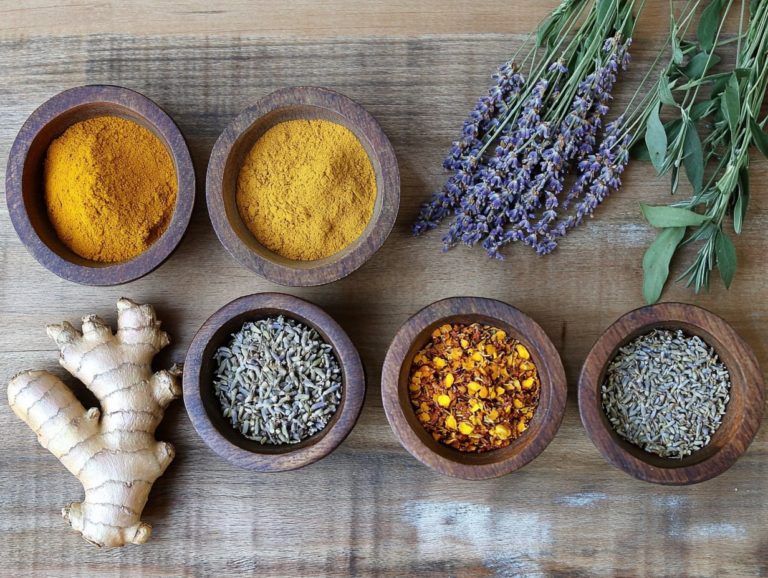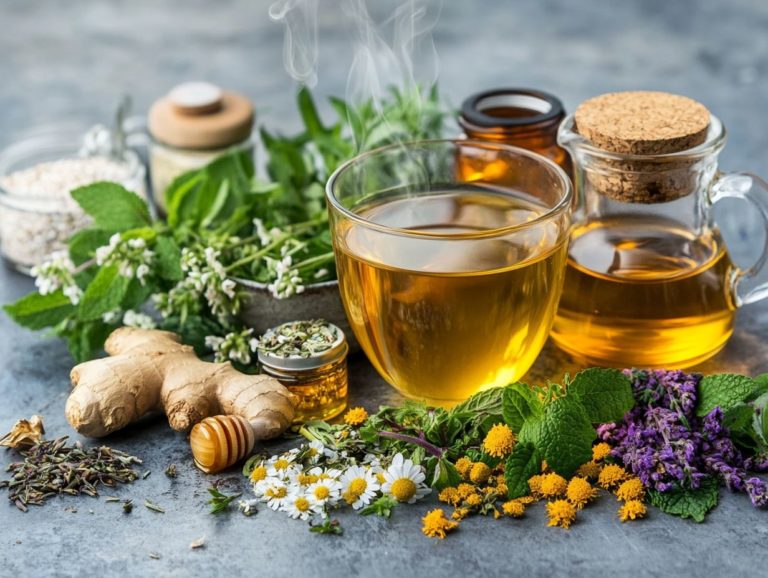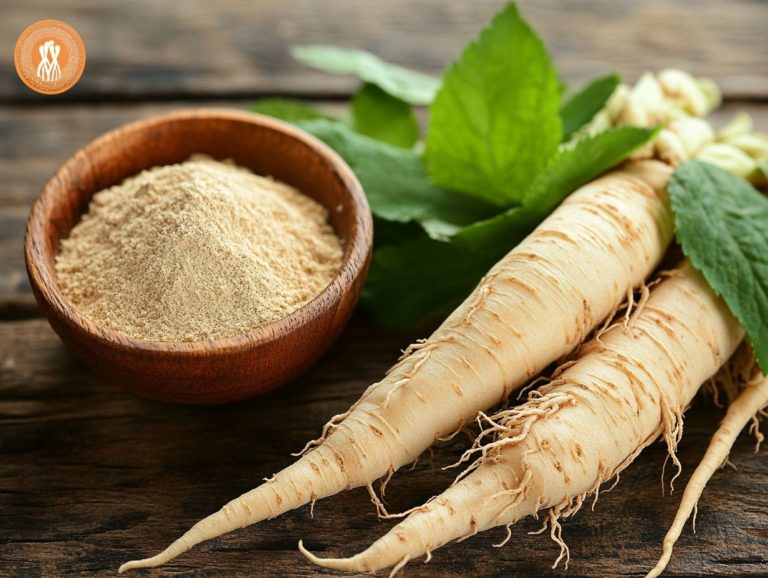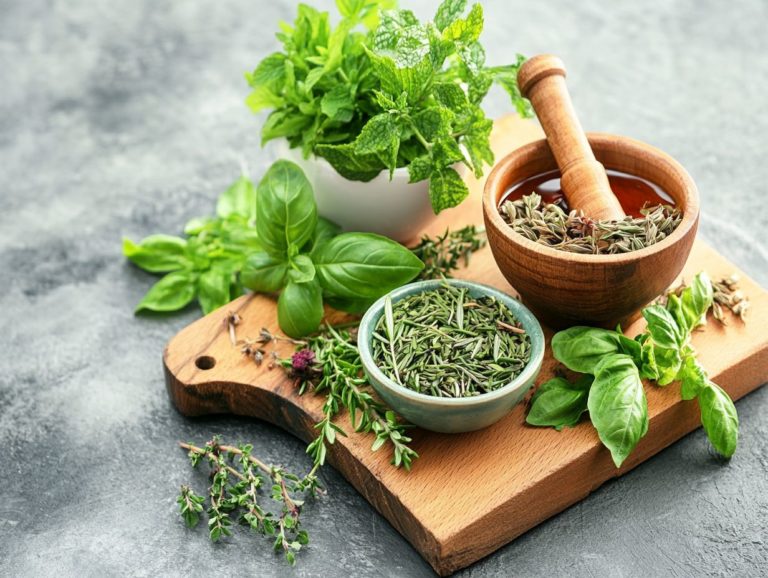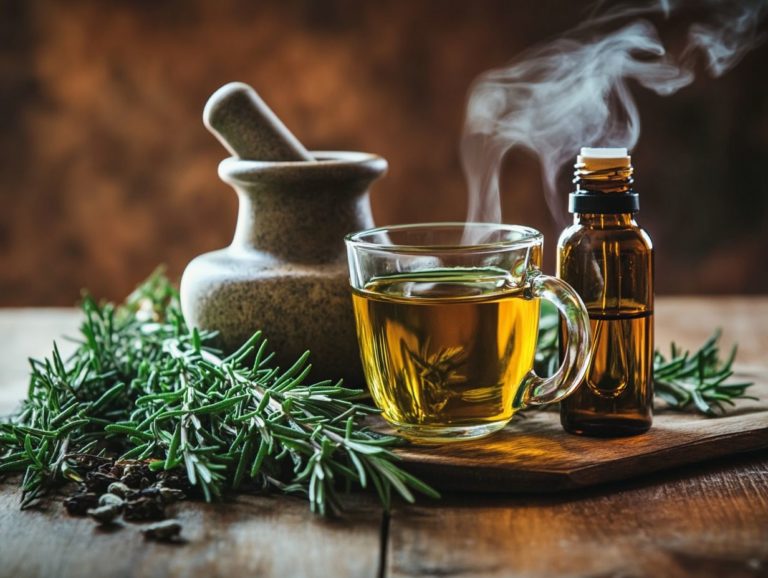How to Make Herbal Infused Oils
Herbal infused oils present a delightful opportunity for you to harness the natural benefits of herbs for both health and skin care.
This article unveils the myriad advantages these oils can offer, from their therapeutic properties to their nourishing effects on your skin. You’ll learn how to select the right herbs and oils for your infusions, the essential tools you’ll need for the process, and a straightforward step-by-step guide to crafting your own.
You will find tips on how to use and store these aromatic creations. Embrace the simplicity of enhancing your wellness routine with herbal infused oils!
Contents
- Key Takeaways:
- Benefits of Herbal Infused Oils
- Choosing Herbs and Oils for Infusion
- Equipment and Supplies Needed
- Step-by-Step Guide to Making Herbal Infused Oils
- Uses and Storage of Herbal Infused Oils
- Frequently Asked Questions
- What is the process for making herbal infused oils?
- What are the benefits of using herbal infused oils?
- What types of herbs can be used to make infused oils?
- Can I use fresh or dried herbs for making herbal infused oils?
- How long does it take to make herbal infused oils?
- How should I store my herbal infused oils?
Key Takeaways:
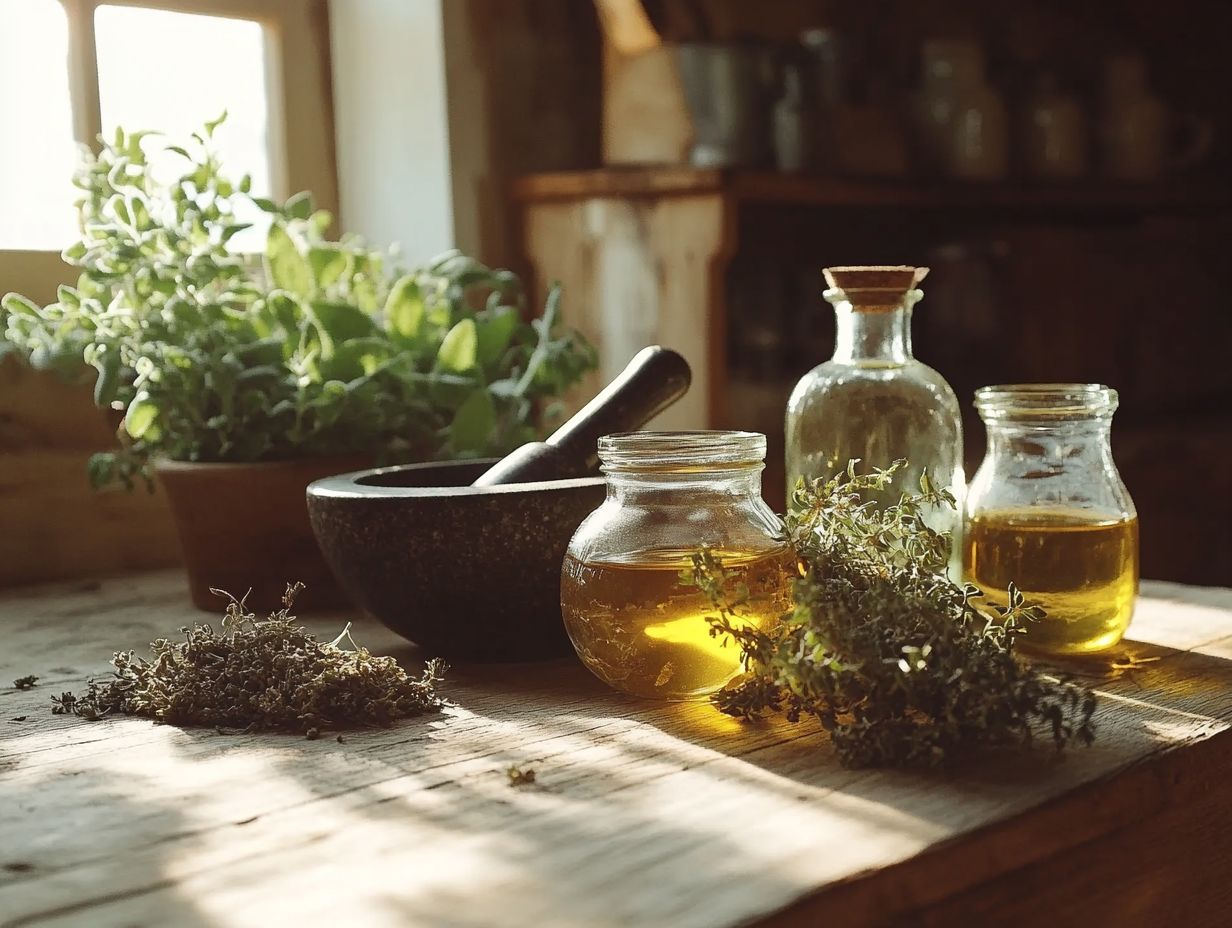
- Discover the benefits of herbal infused oils for both your health and skin.
- Learn about the best herbs and oils to use for infusion and how to choose them for different purposes.
- Equip yourself with the essential tools and follow a step-by-step guide to easily make your own herbal infused oils for a variety of uses.
What are Herbal Infused Oils?
Herbal infused oils are not just any culinary oils; they are carefully crafted to enhance the aromatic and medicinal properties of various herbs. By employing methods like cold infusion (a method that uses room temperature to extract flavors from herbs slowly) or heat infusion, you can extract delightful flavors and nutrients that elevate your cooking.
These oils offer a unique flavor infusion that enriches your dishes and brings along health benefits thanks to the nutritional value of the herbs used.
You might find yourself reaching for common base oils such as olive oil, celebrated for its rich flavor and numerous health benefits; canola oil, which boasts a light taste and remarkable versatility; or avocado oil, full of heart-healthy monounsaturated fats.
Cold infusion preserves those delicate flavors you adore, while heat infusion speeds up the process, rapidly extracting potent essences.
The culinary applications of these oils are vast. They go beyond mere dressings, transforming vegetables, meats, and even baked goods into gourmet masterpieces. Not only do these infused oils enhance flavors, but they also impart the beneficial qualities of herbs, potentially aiding digestion or boosting immunity. They’re a remarkable addition to any kitchen, ready to elevate your culinary creations.
Benefits of Herbal Infused Oils
The benefits of herbal infused oils extend far beyond delightful flavors; they are full of health benefits and nutritional value that can elevate your culinary creations and promote your overall well-being.
By incorporating organic herbs into your infused oils, you enhance the taste and tap into the medicinal properties that offer a range of health advantages.
Health and Skin Benefits
Herbal infused oils present a remarkable array of health benefits that blend culinary and skincare applications, making them essential elements of a health-conscious lifestyle. These oils, full of essential nutrients and herbal properties, can help improve cholesterol levels, enhance skin hydration, and provide natural remedies for various ailments.
Take rosemary-infused oil, for example; it s a wonderful ally for stimulating hair growth and promoting scalp health. Lavender-infused oils are celebrated for their soothing effects, perfect for massage oils or lotions to create a calming experience.
Herbs like thyme and oregano not only add flavor; they pack a punch with antioxidants that support your immune health. By incorporating these herbal oils into your cooking, you elevate the taste of your meals and encourage the use of healthier fats, making your dishes more nourishing.
With such versatility, these herbal oils shine in both natural body care regimens and health-focused culinary practices.
Choosing Herbs and Oils for Infusion
When selecting herbs and oils for infusion, consider the flavors and characteristics of both. This ensures a harmonious blend that elevates your culinary creations.
By choosing organic herbs, you significantly enhance the quality of your herbal infused oils, resulting in a more potent flavor infusion and greater health benefits in your cooking process.
Get started today and enjoy the benefits!
Best Herbs for Different Uses
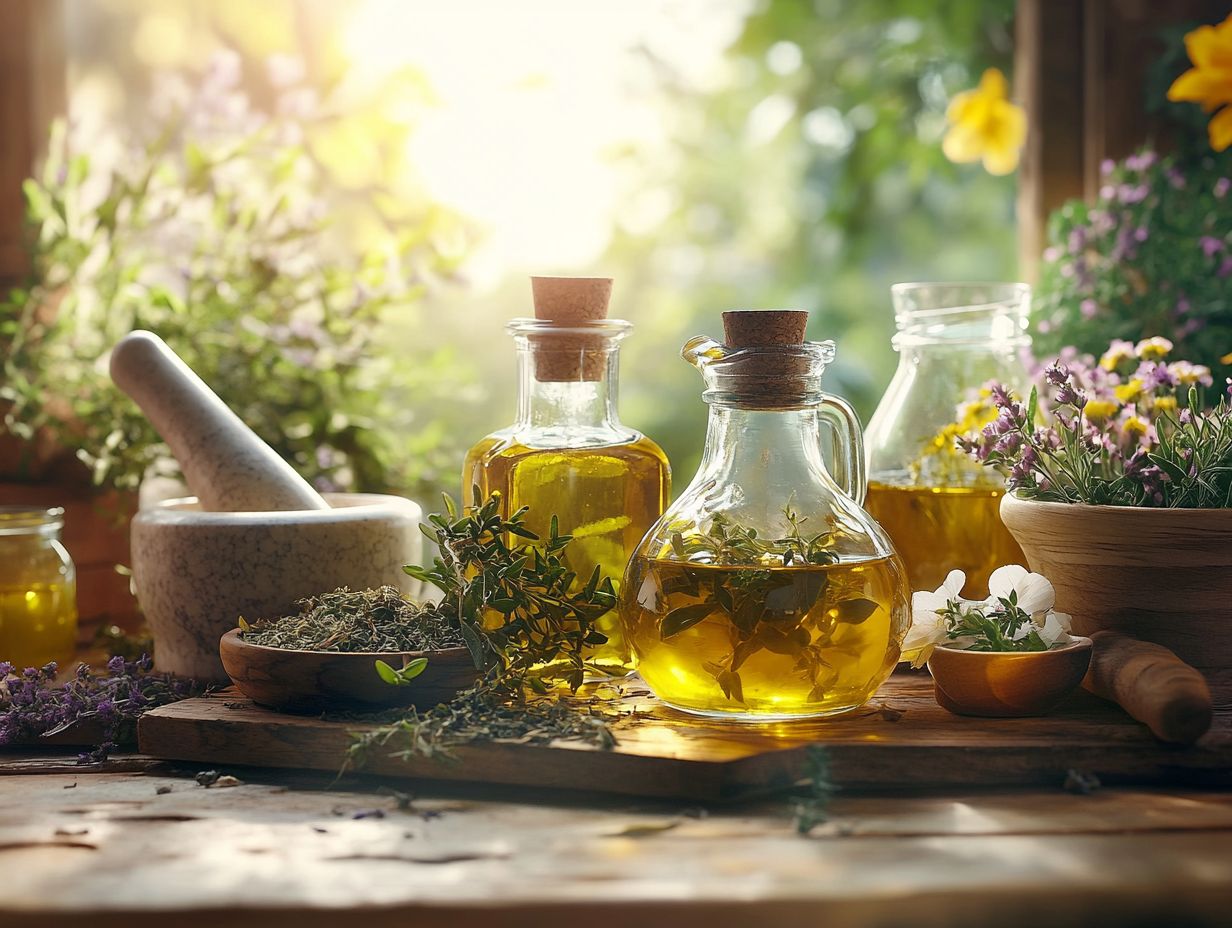
Choosing the ideal herbs for your herbal-infused oils hinges on your specific intentions. Whether you want to elevate your culinary creations, craft medicinal remedies, or develop homemade skincare solutions, the right herbs are essential.
Understanding each herb’s unique traits empowers you. You become a better cook and holistic practitioner, helping you make informed choices. For instance, rosemary and cilantro can transform ordinary dishes into culinary masterpieces, adding a vibrant zest that delights the palate.
Conversely, herbs like lavender and calendula shine in skincare formulations. They provide soothing properties that effectively address various skin issues.
Did you know? The strength of herbs changes between fresh and dried forms! Fresh herbs have more natural oils, which enhance flavor, while dried herbs pack a concentrated punch. Mastering the art of transitioning between these forms can greatly enhance your flavor profiles and the health benefits you reap.
Types of Oils for Infusion
The types of oils you choose for infusion are pivotal in shaping both the flavor profile and health benefits of your herbal-infused oils. You have a range of options olive oil, canola oil, avocado oil, and safflower oil each bringing unique characteristics that elevate the final product.
Take olive oil, for example. Its rich, fruity flavor is bursting with antioxidants, making it an excellent choice for infusing herbs like rosemary or garlic. Canola oil, with its light flavor, serves as a versatile base that won t overshadow delicate herbs, allowing the subtle notes of basil or thyme to shine through beautifully.
Avocado oil, with its creamy texture and high monounsaturated fat content, is perfect for infusing robust flavors, such as chili or smoked paprika. Finally, safflower oil s neutral profile is ideal for highlighting the vibrant essences of mixed herbs, letting you create unique culinary masterpieces that are both healthful and delightful.
Equipment and Supplies Needed
To successfully craft herbal-infused oils, having the right equipment and supplies is essential. This ensures a seamless and effective infusion process.
Key tools you might consider include:
- glass jars
- a fine mesh strainer
- a double boiler for even heat distribution
With this setup, you ll unlock the full flavor and benefits of your herbs!
Essential Tools for Making Herbal Infused Oils
The essential tools for crafting herbal-infused oils are key to achieving optimal infusion methods and effective oil storage solutions. Items like a measuring cup, a funnel for bottling, and dark glass bottles for storage will greatly enhance your oil infusion experience.
A double boiler or a slow cooker is invaluable, gently heating the oils to extract beneficial compounds from the herbs without compromising their properties. Using a fine mesh strainer or cheesecloth is crucial for filtering out plant material, giving you a smooth final product.
Labels play an important role, allowing you to easily identify your creations and keep track of infusion dates. Understanding the right storage conditions is vital. Ideally, keep infused oils in a cool, dark place to prevent exposure to light and air, which can lead to rancidity and a decline in flavor.
By utilizing these tools wisely, you’ll significantly enhance the quality and longevity of your herbal-infused oils.
Step-by-Step Guide to Making Herbal Infused Oils
Creating herbal-infused oils is an elegant endeavor that can be approached with ease by following a few essential steps. This process allows you to extract the maximum flavor and health benefits from your selected herbs and oils, similar to how to make a herbal tincture at home.
By adhering to a straightforward step-by-step guide, you can confidently navigate the infusion journey, whether you opt for the subtle touch of cold infusion or the warmth of heat infusion methods.
Start your journey today and enjoy the art of herbal-infused oils!
Instructions for Infusion Process
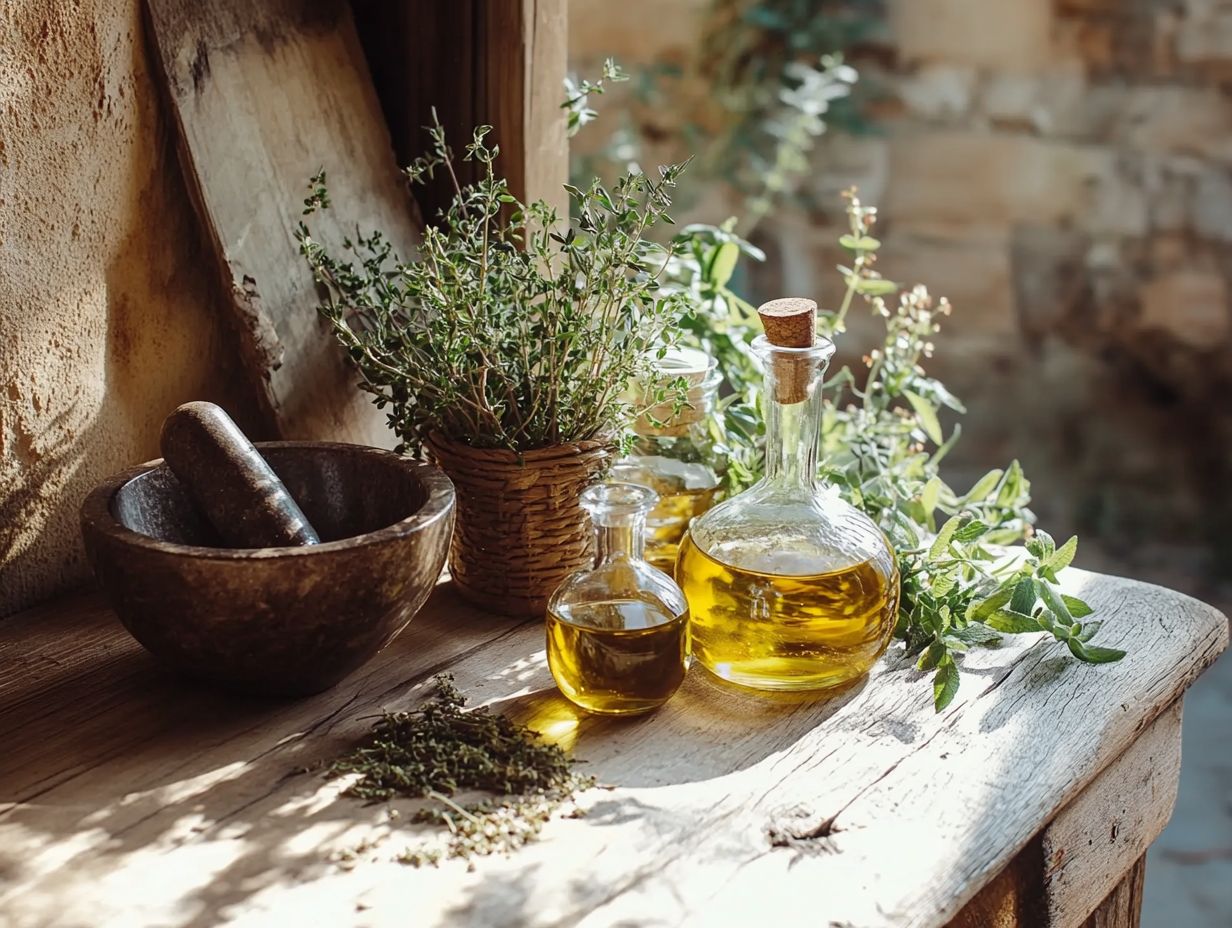
You can use different methods for the infusion process of herbal oils. Choose either cold infusion or heat infusion, as each offers unique advantages and flavors. Start by gathering your herbs, oil, and essential tools. Follow the instructions closely for optimal results.
Understanding the nuances of each technique is vital for unlocking the full potential of your infusion.
For cold infusion, choose either fresh or dried herbs and mix them with a base oil that helps extract flavor from the herbs in a glass jar. Make sure the herbs are fully submerged to prevent spoilage. Place the jar in a sunny spot for several weeks, giving it a gentle shake every few days to encourage the extraction process.
In contrast, heat infusion involves gently warming the herbs and oil in a double boiler over low heat for about 2 4 hours. This warmth will coax out the flavor and benefits of the herbs. Regardless of the method you select, monitoring the temperature and avoiding direct heat is crucial to prevent burning, which could compromise the flavor and aroma.
Once the infusion is complete, strain the oil through a cheesecloth to evaluate its quality. Look for a vibrant color and a fragrant aroma as signs of a successful infusion.
Uses and Storage of Herbal Infused Oils
Herbal-infused oils are incredibly versatile! You can use them in your cooking and skincare routines to create delightful flavors and nourishing blends. To preserve their quality and health benefits, it’s crucial to store these oils properly, ensuring they stay safe and effective for your needs.
Ways to Use and Preserve Your Oils
There are countless ways for you to use and preserve your herbal infused oils, allowing you to savor their flavors and reap their health benefits across various culinary applications and natural remedies. For example, when you use these oils in cooking, they can elevate the taste of roasted vegetables or add a gourmet drizzle to grilled meats, transforming your meals into culinary masterpieces.
In your beauty routines, blending herbal infused oils with base oils can yield nourishing moisturizers or hair treatments that promote radiant skin and glossy locks.
You can also use these oils for health remedies, such as in soothing massages or as a calming aroma for relaxation, which can significantly enhance your overall well-being. To maintain their quality and extend shelf life, employ proper preservation methods like storing them in dark glass bottles in cool places to keep the oils potent and fresh.
Frequently Asked Questions
What is the process for making herbal infused oils?
Making herbal infused oils is simple! Just infuse herbs in a base oil like olive or almond, using heat or a slow infusion method. For those interested in DIY projects, learn how to make herbal salves at home to enhance your herbal remedies.
What are the benefits of using herbal infused oils?
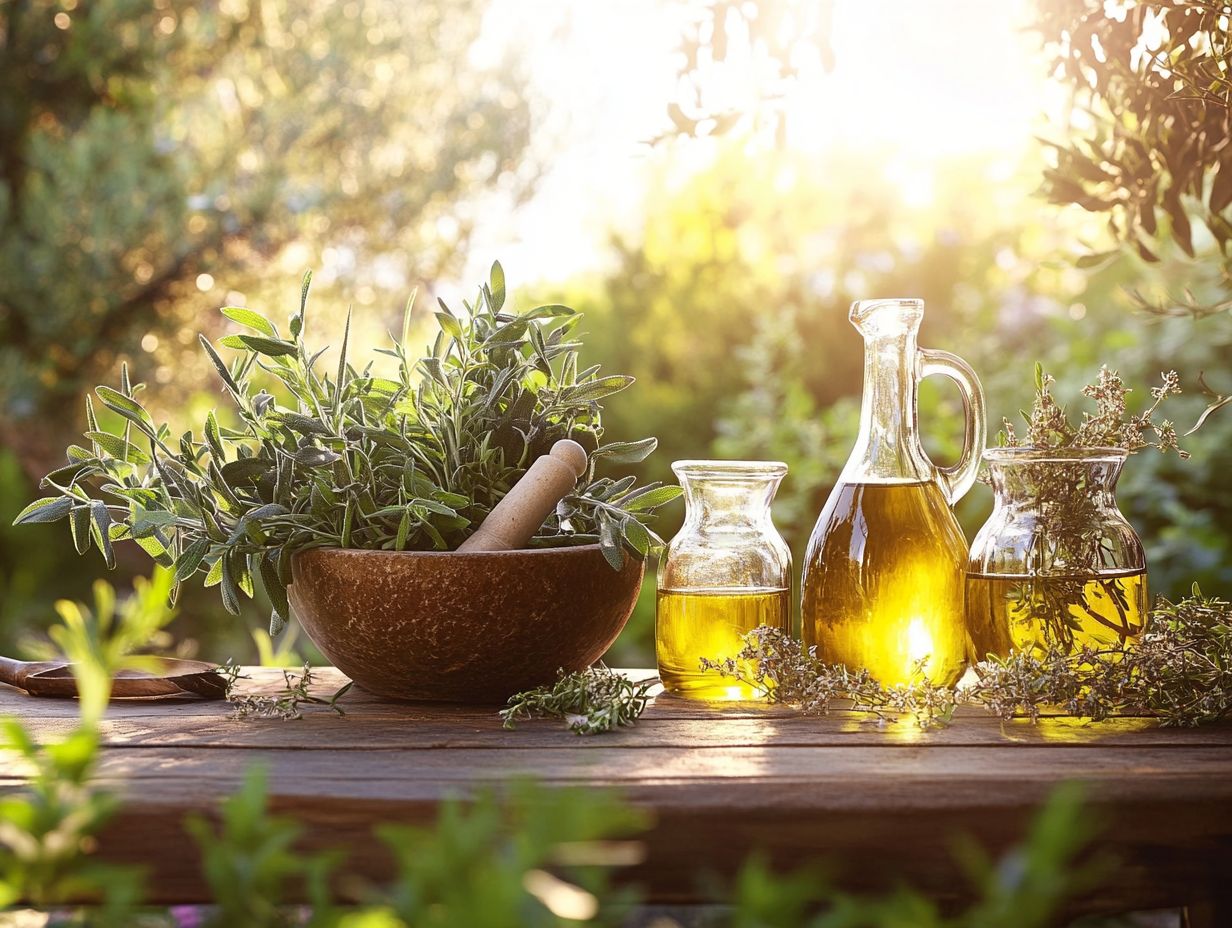
Herbal infused oils have a variety of benefits, such as providing nourishment and hydration to the skin, helping with inflammation and pain relief, and promoting relaxation and stress relief.
What types of herbs can be used to make infused oils?
Any type of herb can be used to make infused oils, including culinary herbs like rosemary and thyme, as well as medicinal herbs like lavender and chamomile.
Can I use fresh or dried herbs for making herbal infused oils?
Both fresh and dried herbs can be used for making infused oils, but fresh herbs may produce a stronger scent and flavor.
How long does it take to make herbal infused oils?
The time it takes to make herbal infused oils varies depending on the method used. Using heat may take a few hours, while the slow infusion method can take several weeks.
How should I store my herbal infused oils?
Herbal infused oils should be stored in a cool, dark place to maintain their potency. It is also recommended to use a dark glass bottle to protect the oil from light.

